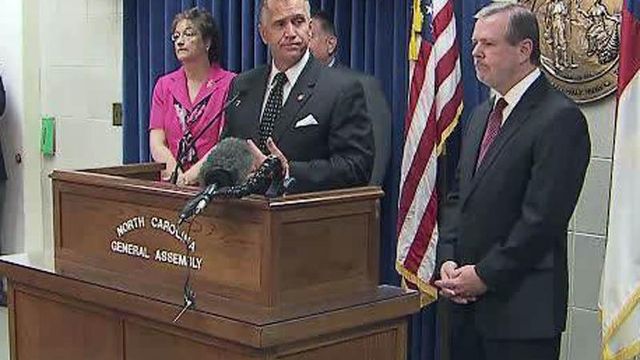Lawmakers reach bipartisan budget compromise
Republican lawmakers banked Tuesday on a new $19.7 billion budget proposal for next year to bypass long negotiations with Democratic Gov. Beverly Perdue, a plan that would preserve funds for 13,000 teaching assistant positions while letting temporary taxes expire on time.
Posted — UpdatedThe Senate made significant changes to its version released last week of a state government spending plan through mid-2013 as a compromise with House Republicans after negotiating a deal for days. GOP leaders are optimistic they'll attract enough House Democrats to vote for the final product to avoid a potential veto showdown with Perdue.
The Senate is expected to vote on the plan Wednesday and Thursday, with House votes set for Friday and Saturday. If approved, the budget could reach Perdue's desk by Saturday afternoon.
The potential deal would spend $300 million more for public schools than the House budget plan approved earlier this month, according to the budget document. The new version restores funding for 13,000 teaching assistant positions in grades 1-3 that had been eliminated in an earlier Senate plan. The House had eliminated assistants in grades 1-2. The University of North Carolina System also would receive $100 million more than the House budget proposed, but $100 million less than Perdue wanted.
The budget also includes money to hire another 1,100 teachers in grades 1-3, which had been part of the initial Senate budget.
"I’m proud of the willingness of our members to reach across the aisle to craft a bipartisan budget,” Senate President Pro Tem Phil Berger said in a statement. “This compromise will fuel job growth, reform education, cut waste and bureaucracy and avoid a government shutdown. We have met the governor more than halfway, and we encourage her to support the compromise.”
Perdue said in a statement that she still has "enormous concerns" with the revised proposal, but she offered no indication whether she planned to veto it.
"With regard to education funding, the proposed budget appears to be a charade," she said. "While the Senate claims to protect teaching positions, they are actually forcing local school districts to make substantial layoffs of education personnel to the tune of more than a quarter billion dollars, meaning thousands of teachers and teaching assistants will be cut. It also appears to take a devastating toll on early education and higher education."
House Speaker Thom Tillis said Perdue's rhetoric doesn't match the math in the budget, but the North Carolina Association of Educators estimated the Senate's revised plan would cut 3,400 teachers and 2,200 teacher assistants.
Five House Democrats voted for the House version of the budget four weeks ago, raising hopes among Republicans that they could get at least four of them to support a final budget compromise. Four would be needed to get the three-fifths of the House members necessary in the House to overturn any Perdue veto. The GOP majority in the Senate already is veto-proof.
Rep. Jim Crawford, D-Granville, said he and other House Democrats pushed for more funding to education and the Department of Health and Human Services.
"We thought it'd be harder to work through the process, but it came together very quickly," Crawford said. "We're committed to the budget as it is today."
Temporary taxes approved by a Democratic-led Legislature in 2009 to close a budget gap would expire on schedule at the end of June under the proposal, meaning the state would lose more than $1.3 billion in revenue. A new small-business tax break would remain in place, but a Senate proposal to cut all three individual income tax brackets by a quarter-percentage point would be shelved.
The extra funds to raise overall public education spending to nearly $11 billion in the compromise largely came from reducing reserves and the coming year's payment for public employee pension funds.
"This bipartisan solution is a big first step toward right-sizing state government,” Tillis, R-Mecklenburg, said in a statement. “This budget is a job-creating budget that incorporates one of the largest tax cuts in North Carolina history.”
The following provisions also are included in the updated proposal:
- Jobless benefits would be extended for 20 weeks for people who have exhausted all other unemployment benefits. GOP lawmakers earlier tried to tie an extension to budget cuts in a separate bill, but they said they would now roll the extension in with the overall budget.
- The elimination of Medicaid services that the federal government doesn't require the state to provide would be scaled back, largely to the level that was proposed in the House budget. The measure would keep in place most adult dental care, podiatry and chiropractic services.
- The State Bureau of Investigation and its embattled crime laboratory would be kept within the Department of Justice, led by Attorney General Roy Cooper. Last week's Senate plan had shifted oversight to the new Department of Public Safety, which would be led by a secretary appointed by the governor.
- Senate provisions would be retained to prevent regulators in the Departments of Agriculture, Labor and Environment and Natural Resources from issuing rules that are more stringent than the federal government. Environmental activists have complained the change would make it more difficult for the state to protect the state's air and water.
- The Health and Wellness Trust Fund, which receives 25 percent of the state's share of the national tobacco settlement, would be abolished, and its $32.9 million would be shifted to a state division to continue smoking and obesity prevention programs, among others. Golden LEAF, the Rocky Mount foundation that uses tobacco settlement money on economic development projects, would lose $17.6 million annually for the next two years.
• Credits
Copyright 2024 by WRAL.com and the Associated Press. All rights reserved. This material may not be published, broadcast, rewritten or redistributed.






